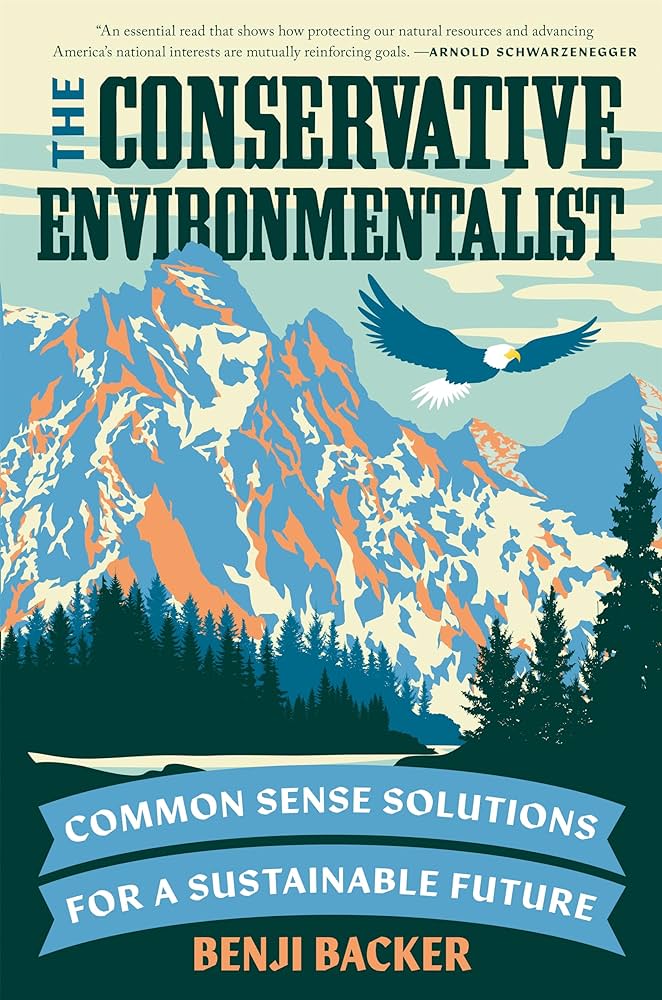
In the fall of 2016, presidential candidates Hillary Clinton and Donald Trump took to the debate floor to go head-to-head in what remains the most-watched political debate in American history, garnering 84 million viewers. One of those viewers was college student Benji Backer, a Wisconsin native attending the University of Washington, who noticed that there was a critical subject missing from the debate that affected each and every person on this planet – climate change.
At the time, Backer thought there was no place for conservative voices to effectively advocate for the environment. So following the debate, Backer set out to change that by founding the American Conservation Coalition (ACC), an organization whose mission is ”to build the conservative environmental movement” and which today counts more than 50,000 members across the country.
Backer has now written a book about this movement. Called The Conservative Environmentalist, the book not only includes Backer’s thoughts on the need to develop sound America-first climate solutions aimed at the future, but why doing so will help Republicans win support among young Americans today.
The Ripon Forum recently talked with Backer about his book, the future of the movement, and whether he believes concerns over climate change and the environment will resonate with voters when they cast their ballots in the election later this year.
_____________________________

RF: First off, what drove you to write this book?
Backer: I was on the top of a mountain in the Arctic Circle in Norway, and I had been approached by Penguin [Random House] to write this book. It was the summer of 2022, right before the midterm election. I felt although ACC had had a lot of impact, there was still this huge missing link in the education literature space, and that there needed to be a book written about this.
ACC is the biggest organization in the right-of- center space, and we have the most national prominence of any right-of-center environmental organization. I was like, ‘Well, if it’s not me who’s going to do it, then who is it?’ And I sent an email at the top of the mountain saying that I was in to do it.
RF: In your discussion of trade-offs in the book, you warn that the government has the ability to blindly over-invest in climate technologies. Are there any specific endeavors you see the industry pursuing that could be major wins for the environment and the taxpayer? And then are there any projects that you would recommend the government steer clear of?
Backer: I think it’s hard to say that the government should steer clear of anything right away, because you don’t know where technology is headed, and it’s impossible to predict what entrepreneurship and ingenuity can unveil. Everything in American history, especially around energy, has been subsidized, whether it’s by the government or by private investors. So, when things are getting off the ground, investment makes a lot of sense. I think where the problem starts is when something doesn’t work — over the course of five, ten, fifteen years. It’s difficult for the government to back off of those programs.
I think we should stay clear of being unwilling to admit that we’re wrong about [some] things. I think it’s okay to kind of put your eggs in every basket and see what happens. We should be investing in new technology for nuclear, natural gas, solar wind, hydrogen, hydropower. Every other country that has economic prowess is doing that because they know that the future of energy is unknown.
I think it’s okay to kind of put your eggs in every basket and see what happens. We should be investing in new technology for nuclear, natural gas, solar wind, hydrogen, hydropower.
But if it’s proven that solar has hit a wall or nuclear has hit a wall or whatever, we shouldn’t be afraid to admit, ‘Hey, maybe this is something we should back off of.’ Then the tough question is, how do you back off of it? Well, you have to ramp it down. You can’t just remove it at the snap of a finger because it would have drastic negative consequences. I think because the government is not a for-profit business, it doesn’t have the incentive to undo the regulations, incentives, et cetera, where they are incorrect.
I also believe that we should be focusing on solutions that don’t just revolve around energy production, but also revolve around restoring natural ecosystems, using conservation to protect the environment, active management to protect the environment.
RF: Another common theme in your book is local involvement and grassroots organizations. Is there a particular city that stands out to you that has really got it right? And, if so, what could the federal government learn from the city when creating federal environmental policy?
Backer: I think Scottsdale, Phoenix, and Tempe, Arizona are great examples of leadership on this issue because they’re forced to grapple with environmental challenges head-on. Even if climate change wasn’t real, water would [still] be a significant concern, and the efficiency standards that they have for water are remarkable. The way that they’ve figured out how to use water efficiently should be modeled with the rest of the world.
At the same time, they’re increasingly using a ton of solar because it’s very sunny there, but it’s not blanketing the landscapes of Arizona. Then at night, they use natural gas, nuclear, and coal, and that’s what has to happen.
Wyoming is the state that I think is doing the best job. Their governor, Mark Gordon, has unleashed an energy and environmental agenda that basically says, ‘If you want to be a part of the clean energy revolution, you should do it in my state.’
They’re leading in wind production. They’re leading in nuclear energy production. And they’re leading in carbon capture and storage facilities, not necessarily in today’s production numbers, but they’re welcoming the most amount of businesses, plants, and facilities in their state because they know that it’s good for their economy. It’s going to create good jobs, it’s going to boost their communities, and it’s windy there.
They’re using their local knowledge and their local geography to protect the environment. But also, they’re bringing tens of thousands of new jobs in every single year because of it.
RF: Are there any key elements of these plans that the federal government could draw from when implementing future climate policies and really reinvigorating clean energy production?
Backer: There are a couple of areas where there needs to be some more support from the government. One is transitioning communities that have been reliant on coal to other energy mechanisms. Wyoming, again, is a perfect example. There was this coal plant that was about to close, and this next-generation nuclear company went in and said, ‘We’re going to start our nuclear plant next to this coal plant so that those people can have jobs and be a part of the local economy. Then the town that they live in doesn’t have to go bankrupt.’
Those are the sort of things that I think the federal government should support, because there are a lot of really vulnerable Americans in the south and in the northeast and out west who are working in these industries. Let’s figure out how to keep those communities a part of the solution. I think it’s a really important place for the government to play a role.
I also think one of the things that gets brought up a lot in D.C. is permitting reform. We have the ability to grow exponentially the energy production in this country to be cleaner and more efficient, but our government isn’t allowing it to happen. They’re spending ten years reviewing projects that should only take a couple of months. And by the time they actually review something, it’s not worth it anymore for companies. And so, no one wants to do business in the United States.
If you’re a foreign company and you see the rules the federal government has, you wouldn’t want to do business here. The most pro-climate thing the federal government could do is say, ‘We want your energy conservation, anything related to climate, we want your business here, and we’re going to make it as easy as possible for you to do that while also safeguarding the importance of some sensible regulation to make sure that we don’t destroy anything.’ Right now, the federal government is standing in its own way, and there are some regulations that are really harming our ability to do the right thing.
RF: What would you say has been the number one most effective tool provided by the Inflation Reduction Act (IRA) to combat climate change? And then also do you think it could be replicated in future policy or strengthened?
Backer: I think that there are a lot of downsides to the IRA, but there are a lot of upsides to the IRA too. One of the biggest upsides is that it has a focus on doing things in America and it’s trying to incentivize the production of solar, wind, nuclear, and electric vehicles in the United States. But I do think that those incentives are basically worthless if the government can’t get out of its own way.
The conservative movement right now is very focused on this America- first mentality, and we should be America-first on climate. We should be leading with American technology and American ingenuity.
The best thing for us to do is have an America focus, which is a very pro-conservative message, right? The conservative movement right now is very focused on this America-first mentality, and we should be America-first on climate. We should — and can — be leading with American technology and American ingenuity. Although imperfectly, I think the Inflation Reduction Act shows Democrats can be on board with that message, too.
RF: Final question – Election Day is just around the corner. How have you seen the GOP promote climate change to win over young environmental-forward voters, many of whom will be voting for a president for the first time?
Backer: Unfortunately, it is clear right now that there still is one party leader that is pro- climate and one that is not as outwardly spoken on it. Young people will definitely, if they care about the environment and care about climate, be more attracted to the Democratic party – and that’s something that should be a wakeup call for Republicans.
What’s disappointing to me about that reality is that Republicans have led a lot over the last few years, and Donald Trump has an opportunity over the next few months to carve out his lane as being pro-America and pro-climate at the same time.
But because he hasn’t done that yet, it comes across to most people who don’t pay that close of attention to what bills are passing in Congress that the whole party doesn’t believe in climate change and the whole party doesn’t care about the environment. When young people see that, they want to run the other way – even if it’s not their top priority issue.
Republicans have helped pass some of the biggest bipartisan climate environmental policies of all time over the last five years. But no one knows about them. I do believe that the Republican party has come a long way, but the narrative hasn’t necessarily changed, so young people will by default be more attracted to the Democratic party on this issue. I would say there’s a significant chance that by the time the election rolls around, that we have two pro-climate, pro-environmental presidential candidates, and my goal is to get us there by November.




